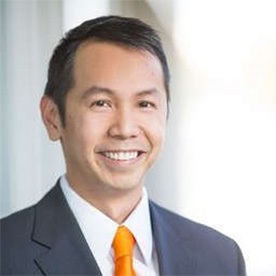
Editor’s Note: Originally published by Texas Global, written by Alex Briseño
When the LEGO Group, one of the world’s most prominent toy and production companies, invited Texas Engineering alumnus Andy Chang (Ph.D. mechanical engineering 2017) to its headquarters in Billund, Denmark, it came with an enticing opportunity: to significantly contribute to creatively designing the global company’s future as the next vice president of play engineering.
Chang now leads a team of more than 250 engineers responsible for every technologically enabled LEGO product, such as LEGO City trains and remotely powered LEGO Technic race cars. Chang, who ranked as the No. 31 engineer in the world by Key Executives in 2022, admits that his career has already taken him further than he could have ever imagined.

“When I talk to students, I say, ‘You never know where you will end up in three, five years’ time,’” Chang said. “I am the type of person who believes opportunities will come to you. That’s actually how I came to the LEGO Group. The reality is that I was head-hunted for this role. I didn’t even know a role like this existed at the LEGO Group.”
Hired at the height of the pandemic, Chang didn’t have the opportunity to visit the LEGO Group’s headquarters; he had never been to Denmark before taking the job in February 2021.
“My wife and I decided to jump in with both feet,” Chang said of the experience. “Having lived in Germany prior to this, we learned we will never fully immerse into an environment if we have one foot in and one foot out, which has a negative impact. Hindsight is always going to be 20/20, but instead of dwelling on it, we learn from it. This has been quite helpful in my career so far.”
Embracing Risk
A thread that interweaves Chang’s professional and personal life is his willingness to take risks, which has paid great dividends. Born in Taiwan, Chang relocated with his family to the United States at a young age and grew up in Diamond Bar, California, in eastern Los Angeles County just north of neighboring Orange County.
Chang recalls growing up there, witnessing the affluence and lack thereof, and questioning from an early age the stark socioeconomic disparities he often observed.
“That actually taught me a very important lesson earlier on,” Chang said. “Southern California is great for a lot of people, but there’s a lot more in the U.S. that prompted me to explore — not just culturally, but to also experience different states, different people and different weather. That has a lot to do with my willingness to be more mobile now.”
After earning a bachelor’s from the University of California San Diego in 2006 — his first of three mechanical engineering degrees — this philosophy sent Chang to Ann Arbor, Michigan, where he obtained a master’s from the University of Michigan in 2007. Chang’s third move brought him to Austin to earn his doctorate.
During his time on the Forty Acres, Chang was already working for National Instruments, an American multinational company that produces automated test equipment and virtual instrumentation software, with international operations headquartered in Austin.
“National Instruments had co-founders and senior executives who were all engineers,” Chang said. “I was really inspired by their ability to be great engineers who are also business-oriented and help solve problems in a meaningful way.”
He added, “I knew nothing about Austin before coming here. I said, ‘Sounds great,’ and jumped in. It might have been a little foolish, but it was another one of those opportunities that I wanted to take.”
Learning from Corporate, Academic Worlds
It wasn’t a lifelong love for numbers that landed Chang in engineering — he didn’t enjoy math in school until he gravitated naturally toward calculus. But eventually, that affinity, combined with his desire to apply theory, is what led Chang to pursue a career in engineering.
Arriving at UT, Chang balanced his pursuit of a doctorate with his work at National Instruments. Existing in the corporate and academic worlds simultaneously required him to reconcile two vastly different timelines and approaches.
“In a corporate world, you look at the very, very short term in the grand scheme of things,” Chang said. “You’re looking at the immediate impact, the results, the product that needs to be released, and so on. In academia, you look more for the long-term impact, or maybe even impacts beyond any of our lifetimes.”
Chang added, “At UT, I also learned how to be a pragmatic problem solver. Academia is sometimes viewed as highly theoretical. At UT, though, much of the faculty I worked with were quite pragmatic toward bringing the solution to a real-world problem.”
Now, the UT Austin alumnus is working with Texas Global to arrange a tour of the LEGO Group’s headquarters for Longhorns in Copenhagen who are currently enrolled in the Take the World by the Horns program, an education abroad opportunity for first-time-in-college students to begin their college journeys across the world.
Sustaining Relevancy
While adjusting to a new life in Denmark, Chang learned the nuances of working in a different culture — one that highly values work-life balance — while simultaneously being tasked with inviting imagination through design.
“The LEGO Group actually is not just a toy company,” Chang said. “The LEGO Group is a multimedia organization. When Julia Goldin took over as our chief product and marketing officer, she wanted to establish our identity, which starts with children: How do you stay relevant to kids?”
The answer to that question determines whether or not the LEGO brand avoids following in the footsteps of other childhood fixtures that have faded from relevancy en route to becoming relics.
Maintaining popularity — let alone growing it — reaches beyond toys now, especially among the company’s particular audience. It’s why the LEGO Group recently announced partnerships with global artists like Pharell for the upcoming movie “Piece by Piece,” and other renowned companies such as Formula 1 and Nike.
“Of course, we can do a lot with two-by-four bricks on their own,” said Chang, referring to the dimensions of the iconic LEGO bricks. “But these partnerships help cultivate relevancy so that the LEGO brand is always top of mind [for consumers]. That is incredibly important to us as an organization.”
Designing The Future of LEGO Play
With each innovative product the company releases, Chang and his team epitomize the meaning of LEGO: an abbreviation of two Danish words “leg godt,” translating to “play well.”
One of Chang’s proudest moments at the LEGO Group arrived recently, on August 1, after he helped launch the LEGO Technic Porsche GT4 e-Performance Race Car. Any LEGO products with electronic or application components, such as this set, are creations of Chang and his team.
“It’s a full-stack engineering team,” Chang said. “From mechanical to electrical to firmware to app developers to infrastructure as well as project managers and product managers — you name it, that’s my team.”
Every successful product release comes with the humbling experience of “kid tests,” Chang revealed. His team meticulously designs numerous mock-ups of remote-controlled vehicles and puts them in front of children to understand how they naturally interact with the product.
“Kids are amazing because they will just tell you how it is,” Chang said. “You learn a lot early on; you also learn to be humble really quickly. You try to explain how great the technology is, and they will say, ‘I don’t care. It’s not fun.’ and you say, ‘OK, we’re sorry.’ ”
For Chang and his team, “playing well” looks like honing in on design and building a technology that contains more fun — and that, at its core, can be a Porsche GT4 e-Performance Race Car in August and transform into a different model down the road.
“Being able to design and release these amazing products that spark curiosity and imagination, but also do things that make people say, ‘I didn’t know this is something that the LEGO Group could do,’ has been really exciting for me,” Chang said.
Chang is executing exactly what the LEGO Group brought him on board to accomplish, and he embodies the idea that opportunities will present themselves through hard work, flexibility and preparation. This mindset sent him to UT Austin, Germany and, now, Denmark; it’s why Chang remains grateful that he embraced the excitement and unfamiliarity that came with the initial opportunity the LEGO Group offered him just three and a half years ago.
“What you need to do is be true to yourself,” Chang said. “Ask yourself, ‘What is it that I really want?’ There will be risks, but you need to grab opportunities with both hands if you realize it’s what you really want.”
